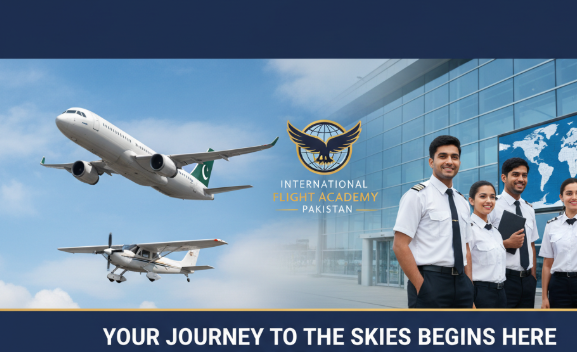
Aviation in Pakistan has long been a critical component of the country’s transportation and defense infrastructure. As air travel continues to expand and the demand for skilled pilots increases, international flight academies in Pakistan have become pivotal in shaping the future of aviation professionals. This comprehensive guide covers the key elements of the International Flight Academy in Pakistan, offering aspiring pilots a deep dive into the qualifications, training programs, and opportunities within the field.
Introduction to International Flight Academy in Pakistan
An International Flight Academy in Pakistan is a specialized institution that provides rigorous training programs to aspiring pilots, equipping them with the skills, knowledge, and certifications necessary to become professional pilots. These academies offer various flight training programs, including the pilot program, aviation institutes, and flight school courses, all tailored to meet international standards.
These academies prepare individuals for a variety of aviation-related careers, such as airline pilots, flight instructors, commercial pilots, and even space program professionals. Their training focuses on essential aviation skills, technical knowledge, and soft skills, ensuring that graduates can thrive in both national and international aviation sectors.
Importance of Aviation in Pakistan
Aviation plays a crucial role in Pakistan’s economy, connectivity, and defense. The growth of both domestic and international air travel has transformed the aviation industry into a multi-billion-dollar sector. Pakistan’s strategic location in South Asia makes it an essential hub for international flights, connecting the Middle East, Europe, and Southeast Asia.
The country is home to several aviation careers, and the government has recognized the need to boost pilot training, thereby enhancing the country’s aviation infrastructure. Pakistan International Airlines (PIA) and private carriers like Airblue, Serene Air, and Flydubai are major employers of pilots in the region, further emphasizing the need for a well-trained aviation workforce.
Additionally, with global air traffic on the rise and increasing demand for qualified pilots, Pakistan’s aviation institutes are increasingly training pilots for both local airlines and international operations.
History and Development of Aviation in Pakistan
Early Aviation History of Pakistan
Pakistan’s aviation history dates back to the early 1950s when the government established its first air force and civilian aviation institutions. In the early years, aviation was primarily driven by the Pakistan Air Force (PAF) and military training programs. However, with the establishment of Pakistan International Airlines (PIA) in 1955, the country’s commercial aviation industry began to develop.
Milestones in Pakistan’s Aviation Industry
- 1955 – Establishment of PIA: The national carrier, PIA, was formed to serve both domestic and international routes. Over the years, it became a central player in Pakistan’s aviation industry.
- 1970s – Expansion of Domestic Aviation: Domestic air travel became more accessible, with new airports and services emerging.
- 1980s – International Aviation Growth: Pakistan’s aviation infrastructure expanded, with Pakistan becoming a key stopover for international flights.
- Modern Day – Aviation Boom: Pakistan has seen a significant increase in air travel, particularly with the rise of private airlines.
These milestones have paved the way for modern aviation education and pilot training in Pakistan.
Current Role of International Flight Academy in Pakistan
International Flight Academies in Pakistan have become vital in providing world-class training to aspiring pilots. These institutions focus on both aviation careers in Pakistan and the increasing demand for pilots on a global scale. They are an essential part of Pakistan’s aviation ecosystem, offering education and training that aligns with international standards.
Academies across Pakistan offer specialized training programs designed to prepare pilots for civil aviation, military aviation, and even space programs. They play an important role in bridging the skills gap, which is necessary for Pakistan to meet international aviation demands.
Eligibility, Training, and Skills Required
Basic Qualifications
To enroll in a flight academy in Pakistan, aspiring pilots must meet the following basic qualifications:
- Education: At least a high school diploma, with preference given to those holding a degree in aviation-related fields.
- Health: Candidates must undergo a thorough medical examination to ensure they meet the physical standards required for flying.
- Age: Most academies accept candidates between the ages of 17 and 30 for pilot training.
Technical Skills
Pilot training programs focus on building essential technical skills in areas like:
- Navigation: Understanding of how to plot courses and navigate using instruments.
- Meteorology: Knowledge of weather patterns, how they affect flying, and how to read weather charts.
- Aircraft Systems: A detailed understanding of how various aircraft systems work.
Soft Skills
Soft skills are crucial for a successful career in aviation:
- Leadership: Pilots must exhibit strong leadership qualities to manage the flight crew and passengers.
- Decision Making: Critical thinking and the ability to make quick, effective decisions are essential in high-pressure situations.
Institutes, Academies, and Training Centers in Pakistan
Here are some of the leading flight academies and institutes offering pilot training in Pakistan:
- Pakistan Air Force Academy (PAFA) – This prestigious institution provides both military and civilian pilot training.
- Cranfield Aviation Training Academy – A private academy offering commercial pilot training, equipped with state-of-the-art simulators.
- Peshawar Aviation Academy – A renowned academy for training pilots for both domestic and international airlines.
- Karachi Aviation Academy – Offers various pilot courses, including flight training and flight instructor certification.
- Indus Aviation Academy – Focuses on providing affordable pilot training and offers international aviation standards.
In addition to these, Pakistan has several other smaller but well-respected training centers that contribute to the growing demand for aviation professionals.
Government Initiatives in Aviation
The Pakistani government has also introduced initiatives to improve the country’s aviation industry. Pakistan Civil Aviation Authority (PCAA) is a regulatory body that ensures aviation standards meet international guidelines. Moreover, national programs such as the Airline Pilot Program in Pakistan have helped promote aviation as a career path for young people.
Technology and Innovation in Aviation Training

The aviation industry in Pakistan is embracing technology and innovation in training, especially with the integration of flight simulators and AI-powered cockpit training. Modern flight simulators are used extensively in pilot courses in Pakistan to help students experience real-world scenarios without the risks associated with actual flying.
Additionally, technological advancements in spacecraft navigation and AI in space travel are increasingly incorporated into aviation training programs. Pakistan, with its growing interest in space exploration and satellite technology, has begun to align its aviation institutes with global standards set by space agencies like NASA, ISRO, and ESA.
Challenges Faced in Pilot Training in Pakistan
Despite the progress in aviation education, Pakistan faces several challenges in the training of pilots:
- Infrastructure Gaps: While Pakistan has made strides in improving its aviation infrastructure, many academies still lack modern facilities and training equipment.
- Costs: Pilot training can be expensive, and not all aspiring pilots have access to the necessary funds.
- Regulatory Hurdles: Complex regulations and approval processes can slow down the development of new aviation training centers.
- Brain Drain: Many pilots trained in Pakistan seek employment opportunities abroad, leading to a shortage of locally trained pilots for domestic airlines.
Future of International Flight Academy in Pakistan
The future of aviation in Pakistan looks promising, with emerging opportunities in space tourism and private aviation. Technological advancements, such as AI in cockpit training, are expected to revolutionize the aviation industry.
Furthermore, Pakistan is likely to witness an expansion in national projects related to space exploration, drawing inspiration from global programs like India’s Gaganyaan or China’s CNSA lunar projects. These developments will increase demand for specialized pilots and space program professionals in Pakistan.
Career Path and Opportunities
The journey to becoming a professional pilot in Pakistan typically involves:
- Education: Completing a high school diploma, followed by enrollment in a pilot training academy.
- Pilot License: Earning a Private Pilot License (PPL) and then progressing to a Commercial Pilot License (CPL).
- Advanced Training: Pursuing additional certifications, such as an Airline Transport Pilot License (ATPL).
- Employment: Graduates can seek employment with local airlines or international carriers.
Local salary expectations vary, but pilots can expect a competitive salary based on experience, airline, and type of aircraft. Global scope also offers opportunities for Pakistan-trained pilots to work internationally.
FAQs
- How much does pilot training cost in Pakistan?
Pilot training costs can range from PKR 2 million to PKR 5 million depending on the program and academy. - Which is the best aviation institute in Pakistan?
Institutes like Pakistan Air Force Academy and Cranfield Aviation are considered among the top choices. - What qualifications are needed for pilot training in Pakistan?
A high school diploma, medical clearance, and age between 17-30 are required. - Is international flight training available in Pakistan?
Yes, several academies in Pakistan offer training in line with international standards. - What is the future of aviation in Pakistan?
With expanding infrastructure and international collaborations, aviation in Pakistan is set to grow.
Conclusion
Aviation careers in Pakistan offer tremendous opportunities, and international flight academies play a pivotal role in preparing students for successful careers. With a growing demand for skilled pilots and aviation professionals, aspiring pilots in Pakistan have an excellent opportunity to shape their futures in this exciting field.
SEO Keywords: International Flight Academy in Pakistan, Pilot training in Pakistan, Aviation careers in Pakistan, Flight school in Pakistan, Airline pilot program in Pakistan, International flight training in Pakistan, Pakistan pilot academy, Pilot courses in Pakistan, Pakistan aviation institute, Airline pilot training in Pakistan, Flight instructor in Pakistan, Future of aviation in Pakistan.
![Image: Students inside a flight simulator in Pakistan]
![Image: Modern pilot training aircraft in Pakistan]
